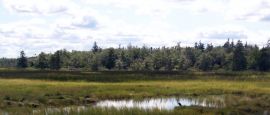The capital, Fredericton, is known for 19th-century architecture such as the Legislative Building, Christ Church Cathedral and Government House. The Beaverbrook Art Gallery has an extensive collection of Canadian, British and Renaissance paintings, a highlight being Salvador Dali's St James the Great.
New Brunswick things to see and do
Tourist offices
Address: PO Box 12345, Campbellton, NB, E3N 3T6, Canada
Tel: +1 800 561 0123.
www.tourismnewbrunswick.ca
Tourism New Brunswick operate five provincial visitor information centres: Woodstock, Aulac, Saint-Jacques, St. Stephen and Campbellton. There is also more than a dozen Municipal Visitor Information Centres located throughout the province.
With 3,814km (19,884 miles) of rivers and streams, New Brunswick is a popular destination for anglers. The Miramichi River, in particular, is famous for salmon fishing. Deep-sea fishing boats are available for charter.
New Brunswick is home to 62 pretty and quirky, historic covered bridges. Particularly famous is the Hartland Covered Bridge, which at 391m (1282 ft) is the longest covered bridge in the world.
The aboriginal town of Metepenagiag (Red Bank First Nation), just outside the town of Miramichi, is worth a visit. It's New Brunswick's oldest town, with archaeological finds that date back more than 3,000 years.
New Brunswick's picturesque lighthouses, which have safeguarded the maritime province for decades, are great lunch spots. Some lovely ones to have a picnic beside include Cocagne Lighthouse, Cape Enrage Light Station, Quaco Head Lighthouse and Richibucto Head Lighthouse.
The province's beaches are renowned for their warm water (they are among the warmest north of Virginia). There are over 40 public swimming beaches, notably Parlee Beach (a provincial park) and Kellys Beach (in Kouchibouguac National Park).
St Andrews has some well-preserved 18th-century houses as well as The Blockhouse, built during the War of 1812 to defend the town from US incursions.
Beautiful rare flora and fauna draw visitors to the unspoilt Fundy Islands, of which birdwatching paradise Grand Manan was once a favourite haunt of the famous ornithologist John James Audubon.
The Reversing Falls in Saint John are a natural phenomenon caused by the powerful tidal waters of the Bay of Fundy, which has the world's highest tides, rising and falling 15m (50ft) twice a day. Dramatic scenery created by the tides includes Hopewell Cape's sandstone 'flowerpots'.
Kayakers often head to the Bay of Fundy, where they can paddle between the gravity-defying rocks of Hopewell Cape. For those who wish to engage in some canoeing, New Brunswick's many rivers are an ideal location to do so.
An invisible force seems to pull your car uphill at Moncton, the province's largest city (it recently surpassed Saint John in population). Magnetic Hill is actually an optical illusion. Other family entertainments are provided at the Magic Mountain Water Park and Crystal Palace Amusement Park.
The temperate eastern shoreline has excellent beaches, particularly near Kouchibouguac National Park, where boardwalks protect the fragile dune ecology; southeast of the park, La Dune de Bouctouche, a white sand dune, has an eco-visitor centre. Parlee Beach is one of the province's largest beaches.
New Brunswick has a vast network of walking, hiking and biking trails, including the International Appalachian Trail, linking with the US trail at Mount Katahdin; Le Petit Temis, which stretches from Edmundston to Rivière-du-Loup in Québec; the Fundy Trail Parkway; and the Acadian Coastal Trail.
Whale-watching tours abound off New Brunswick's coastline: the province boasts more sightings than anywhere else in the world. The Bay of Fundy is home to over 15 species, including the rare right whale. Departure points for tours include Campobello Island, Grand Manan and St Andrews.
Do you have any Feedback about this page?
© 2026 Columbus Travel Media Ltd. All rights reserved. No part of this site may be reproduced without our written permission, click here for information on Columbus Content Solutions.








 You know where
You know where